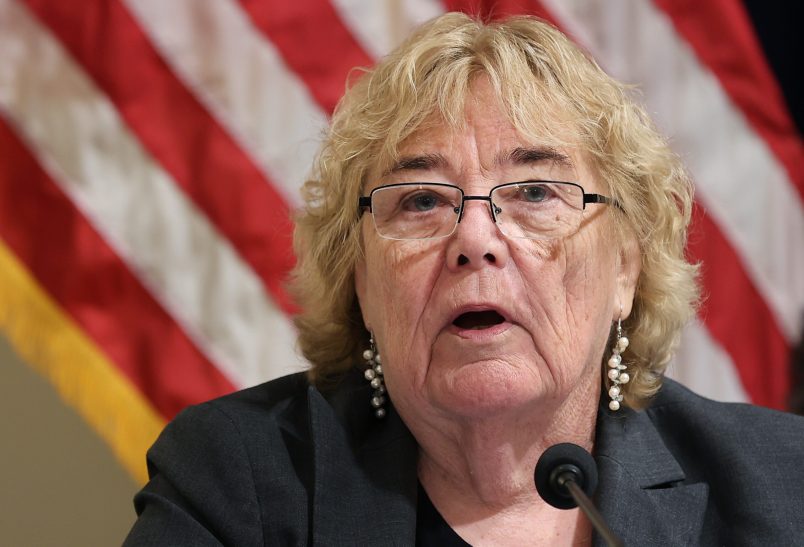After outlining the large scope of the select committee’s investigation, Rep. Zoe Lofgren (D-CA) announced that it had “reached a series of specific findings.” She then proceeded to outline conclusions the investigation had reached that seem to be the bases for some of the criminal referrals against former President Trump from the committee to the Justice Department. Lofgren began by accusing Trump of deliberately making fraudulent allegations about the 2020 election.
“Beginning even before the election and continuing through January 6 and thereafter, Donald Trump purposefully disseminated false allegations of fraud in order to aid his effort to overturn the 2020 election,” Lofgren said, adding, “Ex-President Trump’s decision to declare victory falsely on election night wasn’t a spontaneous decision it was premeditated.”
Lofgren said the committee “has evidence” that, in the leadup to the election, Trump “told numerous allies” he “planned to declare victory and unlawfully to call for vote counting to stop” on election night. There was substantial reporting ahead of the election, which took place on Nov. 3, 2020, that it would be impossible to declare a winner that same day.
Following Lofgren’s remarks, Rep. Jamie Raskin (D-MD) introduced the four different referrals the committee would vote on. Raskin introduced referrals for Trump, attorney John Eastman, and unnamed “others” for “obstruction of an official proceeding” and “conspiracy to defraud the United States. Raskin also introduced referrals of Trump and unnamed “others” for “conspiracy to make a false statement.” Finally, Raskin said the committee would refer Trump for “inciting,” “assisting,” or “aiding and comforting” an insurrection. The committee subsequently unanimously voted to approve all four referrals.
The “findings” revealed by Lofgren are likely some of the basis for these referrals, which would not carry legal weight and instead would function as recommendations to federal prosecutors.
Lofgren also discussed evidence related to Trump’s campaign fundraising, which she indicated was used to dissuade witnesses from testifying to the committee.
“The committee found Mr. Trump raised hundreds of millions of dollars with false representations made to his online donors,” said Lofgren. “The proceeds from his fundraising, we have learned, have been used in ways that we believe are concerning.”
In his opening statement, the committee’s chairman, Rep. Bennie Thompson (D-MS), also hinted at potential criminal referrals.
“We will also show that evidence we’ve gathered points to further action beyond the power of this committee or the Congress to help ensure accountability under law, accountability that can only be found in the criminal justice system,” said Thompson.
A spokesperson for the Trump campaign responded to Lofgren’s comments by attacking the select committee.
“The January 6th un-Select Committee held show trials by Never Trump partisans who are a stain on this country’s history. This Kangaroo court has been nothing more than a vanity project that insults Americans’ intelligence and makes a mockery of our democracy,” the Trump campaign spokesperson said.
Lofgren focused on the alleged conduct of lawyers hired through Trump’s campaign fundraising. She said these attorneys made “efforts to provide or offer employment to witnesses.” Lofgren focused on one witness who claimed they were told by a lawyer linked to Trump that they could “in certain circumstances tell the committee that” they “didn’t recall facts” when they “actually did recall them.” Lofgren claimed that the witness asked this lawyer who they were being paid by and was told, “we’re not telling people where funding is coming from right now.”
Lofgren continued to discuss the situation and said the lawyer offered this witness “potential employment that would make her financially very comfortable.” According to Lofgren, this offer was made to the witness as their “testimony approached.” Lofgren also suggested this type of behavior was part of a broader pattern and not an isolated incident.
“These offers were withdrawn or didn’t materialize as reports of the content of the testimony circulated,” Lofgren said. “The witness believed this was an effort to affect her testimony and we are concerned that these efforts may have been a strategy to prevent the committee from finding the truth.”







“ It’s a travesty of a mockery of a sham of a mockery of a travesty of two mockeries of a sham.”
Yet it wasn’t a court, and there were only like two kangaroos.
Attempted bribery, witness tampering. Quid pro schmoe?
Who had deep pockets to pursue litigation.
That is, to me, the most incredible part of all this. How stupid do you have to be to engage in witness-tampering when it’s almost completely certain you’ll get busted on a national stage? At least in the run-up to the insurrection, they could claim delusion.